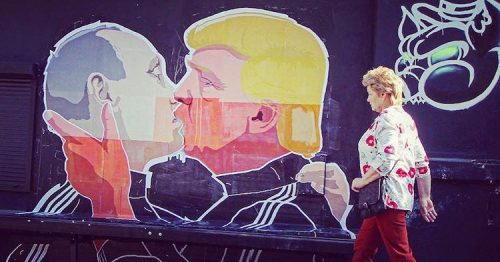Russian President Vladimir Putin ordered an “influence campaign” to impact the 2016 U.S. presidential campaign, a declassified intelligence report revealed.
The 25-page document disclosed the intelligence community’s assessment that the Russian hacks were not only meant to undermine public faith in the democratic process and harm former Secretary of State Hillary Clinton’s presidential bid, but to help President-elect Donald Trump’s electoral prospects.
This influence campaign, according to the report, included covert intelligence activities, such as the hacking of Democratic National Committee emails, as well as “overt efforts by Russian government agencies, state-funded media, third party intermediaries and paid social media users or ‘trolls.'”
The conclusions come towards the end of a presidential transition period that exposed some difference of opinion on Russia between the incoming and outgoing administrations. President Barack Obama in late December announced sanctions against the Kremlin for election-related hacks, including the expulsion of 35 diplomats from the United States.
Trump has tried to play down Russian influence in his election win, calling for the country “to move on.” Most recently in an interview with the New York Times, Trump called the focus on Russia a “political witch hunt.”
The president-elect has been more open to a closer relationship with Russia than the Obama Administration and even many elected officials within his party. This coziness has created some unease by those wary of Russian intentions.
According to DePaul professor Dick Farkas, an expert on Russia, a closer relationship with the Kremlin is not necessarily a bad thing, but an apparent absence of nuance in Trump’s worldview could present a problem.
“What’s dangerous about Trump is not who he chooses to be friends with and who he chooses to be enemies with, and it could easily be that in the end he’ll decide that Russia’s the enemy just as quickly as he decided that they’re okay and a friend,” Farkas said. “The real danger in Trump’s approach is the simplicity of it. It’s never altogether collaborative, warm and fuzzy and it’s never altogether hostile.”
Farkas points to several areas American and Russian interests align, such as space travel, where collaboration is and has been possible.
“I don’t think Trump’s inclination to remain open about the opportunities in Russian-American relations is necessarily a bad thing,” Farkas said. “I think if he refuses intelligence briefings, if he refuses to listen to people with experience, then it gets dangerous.”
The report further assessed that the hacks were just the latest “expression of Moscow’s longstanding desire to undermine the US-led liberal democratic order.” Some have pointed to Trump’s apparent disregard for institutions and established norms as destabilizing factors in a democracy.

“The biggest danger to liberal democracy in the U.S. and elsewhere comes from the breakdown of elite consensus about respecting the ‘rules of the game’,” said DePaul professor Erik Tillman. “The danger comes when elected leaders behave as if it is more important to get their way than to respect the institutions, rules and norms that govern our political system. This leads to a situation that is democratic but not liberal.”
The hacks may have been a way to expose certain elements of the American system that are not particularly democratic and for the Russians to say that democracy has many different forms, Farkas said.
“If you looked at it from their perspective singularly, they’ve got a pretty strong argument that our system is not very democractic,” Farkas said. “It isn’t.”
Farkas points to the Electoral College, the campaign finance system and other examples of undemocratic institutions and norms within the American system. The Russians call their form of government a “sovereign democracy.”
From a foreign policy perspective, some have speculated that Trump’s isolationist, “America first” overtures could benefit Russia.
“I gather that Putin envisions a return to a multipolar world in which Russia is one of the major actors, and a world order in which there is less emphasis on universal liberal values (like democracy and human rights) and more deference to national sovereignty,” Tillman said.
Much of this depends on the actions of the Trump Administration, however. Farkas said Trump could choose to take the ‘informed position’, listening to experts and his advisors, or the less-informed position, make a decision not as much in the American interest.
This is why, despite business and personal ties to Putin, some are not as worried about Trump Secretary of State-designate Rex Tillerson. In fact, Farkas believes Tillerson to be one of Trump’s better cabinet selections.
“Tillerson is a very bright guy and understands that the world’s a complicated place. He’s negotiated in 50 different countries about major corporate kinds of things, albeit with oil,” Farkas said. “Now, (he) doesn’t worry me because I know he’s bright enough to know what he doesn’t know.”
But, it still remains to be seen how the Russian subplot to the 2016 election will play out.

